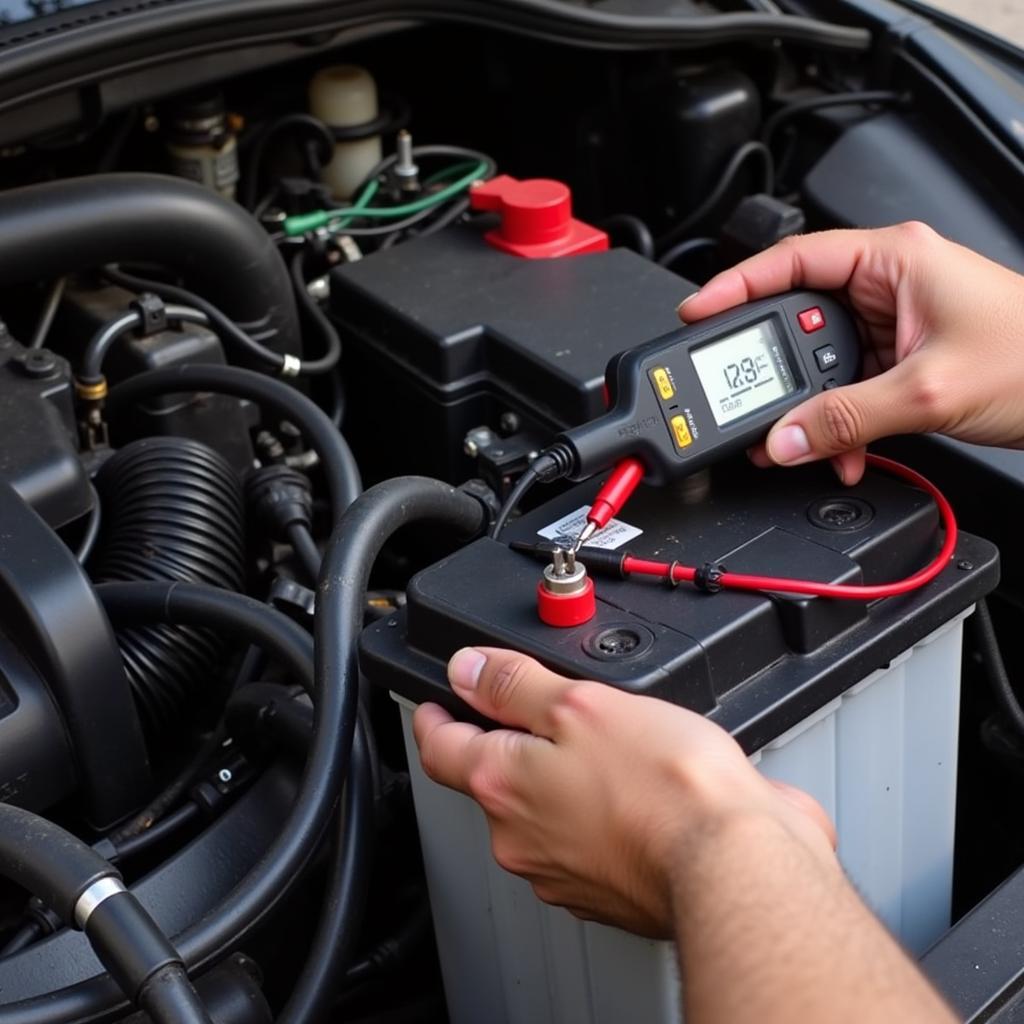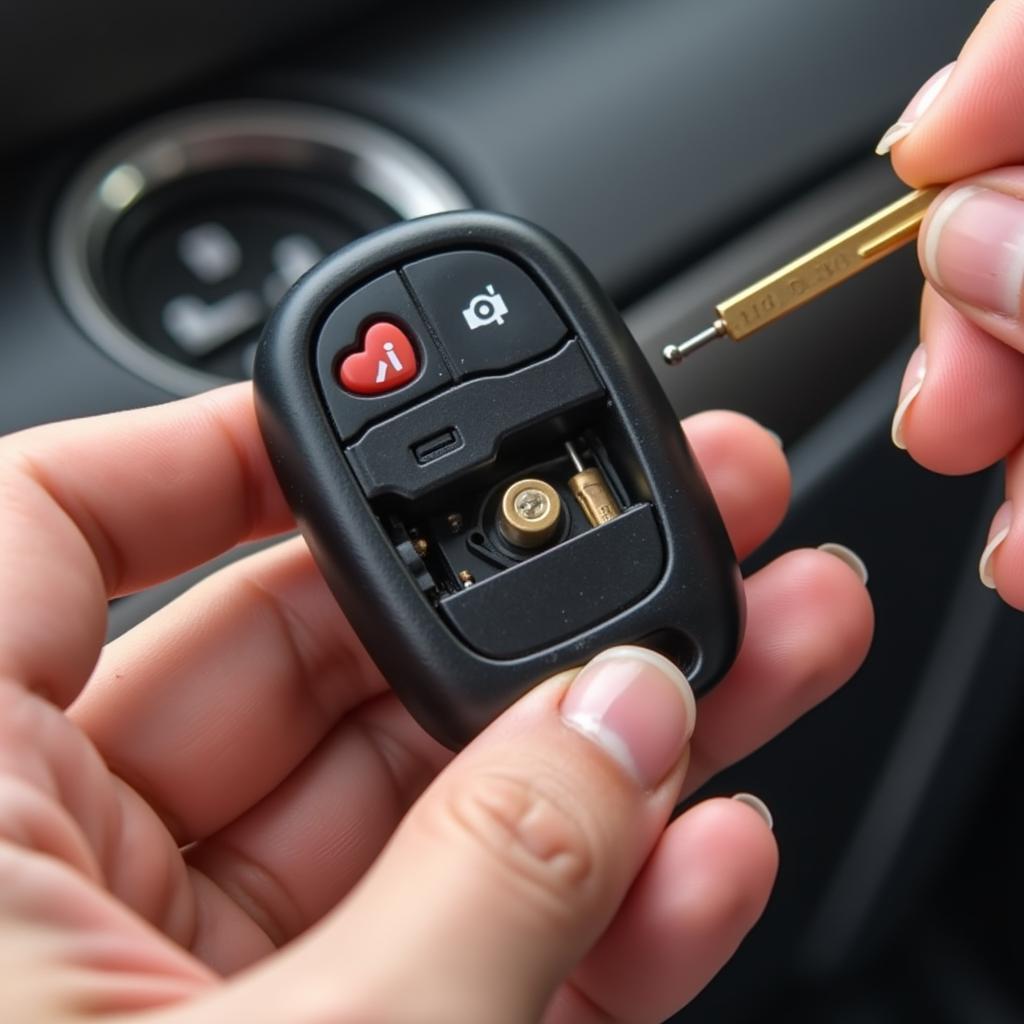Bad car battery symptoms can range from the obvious (car won’t start) to the subtle (dim headlights). Knowing these symptoms can save you time, money, and frustration. As a specialist in automotive electrical engineering, I’ve seen it all, from remote diagnostics and software installations to complex on-site repairs. This guide will equip you with the knowledge to identify, understand, and address those pesky bad car battery issues.
symptoms of bad battery in car
Common Bad Car Battery Symptoms
Several telltale signs indicate a failing car battery. Recognizing these symptoms early can prevent you from being stranded.
-
Slow Engine Crank: One of the first bad car battery symptoms you might notice is a sluggish engine crank. The engine turns over slowly and weakly before eventually starting. This indicates the battery is struggling to provide enough power to the starter motor.
-
Dim Headlights: Dim headlights, especially when the engine is idling, can be another sign of a weak battery. The alternator isn’t producing enough power to keep the electrical system running, and the battery is having to compensate.
-
Clicking Sound When Turning the Key: If you hear a rapid clicking sound when you turn the key, your battery is likely too weak to engage the starter solenoid. This is a common symptom of a completely dead battery.
-
Electrical Malfunctions: A failing battery can cause various electrical issues, such as flickering interior lights, malfunctioning power windows, and erratic dashboard readings. These symptoms occur because the battery isn’t providing stable voltage to the electrical system.
Why is My Car Battery Going Bad?
Understanding the underlying causes of a failing battery can help you take preventative measures in the future.
-
Age: Car batteries typically last between three and five years. Extreme temperatures, both hot and cold, can shorten a battery’s lifespan.
-
Corrosion: Battery terminals and cables can corrode over time, hindering the flow of electricity. Regularly cleaning the terminals can prolong battery life.
-
Parasitic Drain: Even when the car is off, certain electrical components can draw power from the battery. This “parasitic drain” can slowly deplete the battery over time.
-
Overcharging: A faulty alternator can overcharge the battery, causing it to overheat and fail prematurely.
How to Test a Car Battery
Several methods can be used to test a car battery’s health.
-
Voltmeter: A voltmeter measures the battery’s voltage. A fully charged battery should read around 12.6 volts.
-
Load Test: A load test simulates the stress placed on the battery during starting. This test provides a more accurate assessment of the battery’s condition.
-
Battery Tester: Many auto parts stores offer free battery testing services using specialized equipment. This is a convenient way to get a quick assessment of your battery’s health.
 Testing Car Battery with Voltmeter
Testing Car Battery with Voltmeter
How Do I Know if a Battery Cell is Bad?
Sometimes, just one cell within the battery fails. Identifying this requires a more focused approach.
-
Uneven Voltage: If one cell is bad, the overall voltage might appear normal, but individual cell voltages will vary significantly.
-
Low Specific Gravity: A hydrometer measures the specific gravity of the electrolyte in each cell. A low reading indicates a failing cell.
What Should I Do if My Car Battery is Bad?
If you suspect your car battery is failing, take the following steps:
-
Jump-Start the Car: If the battery is completely dead, jump-start the car using jumper cables and another vehicle or a portable jump starter.
-
Have the Battery Tested: Take your car to a trusted mechanic or auto parts store to have the battery tested. They can determine if the battery needs to be replaced.
-
Replace the Battery: If the battery is faulty, replace it with a new one that meets the specifications of your vehicle.
symptoms of a bad cell in car battery
“Regular battery maintenance, including cleaning terminals and checking the charging system, can significantly extend the life of your car battery,” advises John Smith, a seasoned automotive electrical engineer at CARDIAGTECH. “Don’t wait until you’re stranded to address battery issues.”
Conclusion
Recognizing bad car battery symptoms is essential for maintaining your vehicle’s reliability. By understanding the causes of battery failure and knowing how to test your battery, you can avoid unexpected breakdowns and ensure a smooth and hassle-free driving experience. Don’t ignore those warning signs; addressing them promptly can save you time, money, and frustration in the long run.
FAQ
- How long does a car battery last? Typically 3-5 years.
- Can extreme temperatures affect battery life? Yes, both extreme heat and cold can shorten battery lifespan.
- What is a parasitic drain? Electrical components drawing power even when the car is off.
- How do I test my car battery? Use a voltmeter, load test, or have it tested at an auto parts store.
- What are signs of a bad battery cell? Uneven voltage or low specific gravity readings.
- What should I do if my car battery is dead? Jump-start the car and have the battery tested.
- How can I prevent battery problems? Regular maintenance, including cleaning terminals and checking the charging system.

